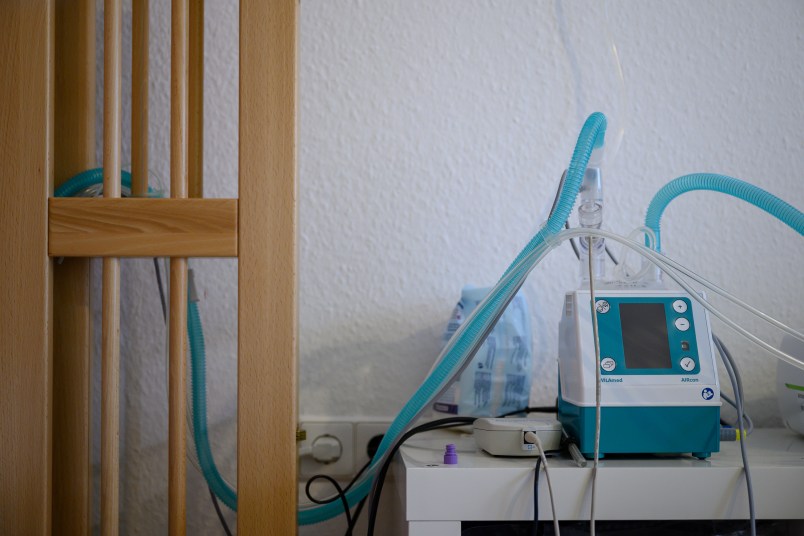This story first appeared at ProPublica. ProPublica is a Pulitzer Prize-winning investigative newsroom. Sign up for The Big Story newsletter to receive stories like this one in your inbox.
The Dutch company that received millions of taxpayer dollars to develop an affordable ventilator for pandemics, but never delivered them, has struck a much more lucrative deal with the federal government to make 43,000 ventilators at four times the price.
The U.S. Department of Health and Human Services announced Wednesday that it plans to pay Royal Philips N.V. $646.7 million for the new ventilators — paying more than $15,000 each. The first 2,500 units are to arrive before the end of May, HHS said, and the rest by the end of December.
Philips refused to say which model of ventilator the government was buying. But in response to questions from ProPublica, HHS officials said the government is purchasing the Trilogy EV300, the more expensive version of the ventilator that was developed with federal funds.
The deal is a striking departure from the federal contract Philips’ Respironics division signed in September to produce 10,000 ventilators for the Strategic National Stockpile at a cost of $3,280 each.
“This kind of profiteering — paying four times the negotiated price — is not only irresponsible to taxpayers but is particularly offensive when so many people are out of work,” said Dr. Nicole Lurie, who served as the HHS assistant secretary for preparedness and response during the Obama administration. “And besides, most of these ventilators will come too late to make a difference in this pandemic. We’ll then ’replenish’ the stockpile at a ridiculously high price.”
“What else,” she asked, “won’t we be able to buy as a result?”
In an article March 30, ProPublica detailed how the agency’s Biomedical Advanced Research and Development Authority, known as BARDA, had anticipated a decade ago that hospitals would run short of life-saving ventilators in the event of a pandemic. BARDA tried to find a company that could produce an inexpensive, durable ventilator that could be operated by people with minimal training during a crisis. After a deal with one company fell apart, HHS in 2014 agreed to pay Philips $13.8 million to design the stockpile ventilator with an option to purchase 10,000 for $3,280 each. The company won Food and Drug Administration clearance for its Trilogy Evo Universal ventilator in July, and in September HHS put in its order.
But Philips didn’t deliver any ventilators to the stockpile even as the coronavirus spread across the globe and hospitals scrambled for ventilators to keep their patients alive. Rather than making the government-funded design, Philips has been manufacturing more expensive commercial versions of the Trilogy Evo at its Pennsylvania plant and selling them overseas and in the United States.
Philips said it was within its rights to sell the commercial versions first because its contract with HHS gave the company until 2022 to produce the cheaper stockpile version. Philips had only made the stockpile version in small batches and didn’t want to ramp up production on a ventilator that it hadn’t mass produced, a slower process than increasing production of other models, company spokesman Steve Klink explained last month. He also said the government contract did not cover all of the costs for the ventilators’ development.
Now the company won’t have to try. The Philips contract announced Wednesday is for the commercial version, the Trilogy EV300, with the government paying $15,039 each.
The HHS statement said the agency purchased “what was immediately available” under “negotiated pricing” with Philips. President Donald Trump directed HHS Secretary Alex Azar to invoke the Defense Production Act in brokering the deal, the statement said.
The government still expects Philips to produce the 10,000 stockpile versions of the ventilator, but no completion date was given in the statement.
Lurie was in charge of the HHS office that struck the 2014 deal with Philips. During her time, congressional Republicans elected on a Tea Party wave forced cuts in federal spending that hampered efforts to bulk up the stockpile. The goal of the Philips deal, Lurie said, was to produce a low-cost, easy-to-use ventilator and use the stockpile’s budget responsibly. But it was also an effort to show the industry that low-cost ventilators were feasible.
“This was a strategy to reduce health care costs,” Lurie said. “This feels like a conspiracy to keep them high.”
In a news release touting the deal on Wednesday, Philips said that it has been ramping up production and this year has delivered several thousand ventilators to U.S. hospitals — including one in hard-hit New York City. The company, which only makes ventilators in the U.S., said it wanted to continue selling ventilators to other countries in need. Klink declined to comment further.
John Hick, an emergency medicine specialist in Minneapolis who has advised HHS on pandemic response, said it would have been better to have a simpler and cheaper ventilator on hand.
“Don’t get me wrong, I am happy they are getting ventilators,” he said. “If you could buy four times as many for the price, why wouldn’t you do that?”
Hick hopes that federal officials will learn a lesson from the Philips deal.
“We have lost a lot of time,” he said. “It’s kind of like telling someone we are going to hurricane-proof your house after the hurricane has hit.”
Filed under:







ProPublica is about the ONLY media source exposing the true evil and duplicity of the Trump Crime Family.
What will the Trump Regime do about this?
So far, this is what the Trump Regime had been doing…
And with the help of the 5-4 Kangaroo Kourt decision, Trump Regime is making Americans risk their lives to exercise their civil duty to vote!
And what about the other vulturistic/pandemic profiteers…?
https://www.newyorker.com./business/currency/how-private-equity-firms-squeeze-hospital-patients-for-profits
I’m really going to enjoy AG Harris’ investigations next year into all the wheeling and dealing and price gouging happening this year.
Only a cynic or a realist would believe this.
I’m sure she does.